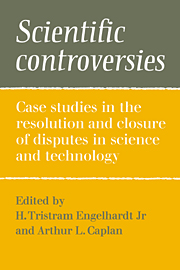 Scientific Controversies
Scientific Controversies Book contents
- Frontmatter
- Contents
- Preface
- List of contributors
- Introduction: Patterns of controversy and closure: the interplay of knowledge, values, and political forces
- PART I THEORETICAL PERSPECTIVES
- PART II CONTEMPORARY CASE STUDIES
- 12 Resolution of the Laetrile controversy: past attempts and future prospects
- 13 Federal regulation of Laetrile
- 14 Quasi libertarianism and the Laetrile controversy
- 15 Judicial deflection of scientific questions: pushing the Laetrile controversy toward medical closure
- 16 Politics, science, and the problem of psychiatric nomenclature: a case study of the American Psychiatric Association referendum on homosexuality
- 17 The diagnostic status of homosexuality in DSM-III: a reformulation of the issues
- 18 On arriving at the American Psychiatric Association decision on homosexuality
- 19 Values in the debate over workplace safety and health: the rancorous rhetoric about regulation
- 20 The successful experiment that failed
- 21 The power of efficiency: balancing benefits and costs in regulating occupational exposure to toxic substances
- 22 Closure in occupational safety and health: the benzene and cotton dust decisions
- 23 Nuclear fear: a history and an experiment
- 24 Closure and controversy: Three Mile Island
- 25 Understanding the nuclear power controversy
- PART III CONTROVERSY, CLOSURE, AND THE PUBLIC
- Author index
- Subject index
13 - Federal regulation of Laetrile
Published online by Cambridge University Press: 03 February 2010
- Frontmatter
- Contents
- Preface
- List of contributors
- Introduction: Patterns of controversy and closure: the interplay of knowledge, values, and political forces
- PART I THEORETICAL PERSPECTIVES
- PART II CONTEMPORARY CASE STUDIES
- 12 Resolution of the Laetrile controversy: past attempts and future prospects
- 13 Federal regulation of Laetrile
- 14 Quasi libertarianism and the Laetrile controversy
- 15 Judicial deflection of scientific questions: pushing the Laetrile controversy toward medical closure
- 16 Politics, science, and the problem of psychiatric nomenclature: a case study of the American Psychiatric Association referendum on homosexuality
- 17 The diagnostic status of homosexuality in DSM-III: a reformulation of the issues
- 18 On arriving at the American Psychiatric Association decision on homosexuality
- 19 Values in the debate over workplace safety and health: the rancorous rhetoric about regulation
- 20 The successful experiment that failed
- 21 The power of efficiency: balancing benefits and costs in regulating occupational exposure to toxic substances
- 22 Closure in occupational safety and health: the benzene and cotton dust decisions
- 23 Nuclear fear: a history and an experiment
- 24 Closure and controversy: Three Mile Island
- 25 Understanding the nuclear power controversy
- PART III CONTROVERSY, CLOSURE, AND THE PUBLIC
- Author index
- Subject index
Summary
Medical science and health care do not exist independently, apart from society. As new applications of knowledge are proposed, some of which will not be totally benign and will be pervasive in their impact, controversies will arise over the distribution of the risks, benefits, and costs involved for different groups that can only be resolved politically. To survive the increasing demands placed on diminishing resources, we must learn to efficiently make the “best” possible political decisions on scientific and technological issues. This seems especially important in health matters, where not only money but life and limb may literally be at stake.
In this paper, I will discuss three issues related to the federal regulation of Laetrile: (1) the federal regulation of drugs; (2) the nature of the scientific and political controversies surrounding Laetrile; (3) the political success of Laetrile. My discussion is not based on formal research and analysis on the Laetrile controversy. I am untrained and unqualified as a medical historian or as a social or political scientist. My presentation is a subjective synthesis of many hours of listening to arguments for and against the unrestricted distribution of Laetrile in two-dozen state legislative hearings, in federal and state courts, and in media “encounters.” I have argued against the distribution of Laetrile.
The underlying assumption of the current regulatory scheme is that defective drug products, or improperly – that is, carelessly or ignorantly – administered drug products may needlessly harm patients. Premarket tests can detect defective products, and instructions for safe use can be given.
- Type
- Chapter
- Information
- Scientific ControversiesCase Studies in the Resolution and Closure of Disputes in Science and Technology, pp. 333 - 342Publisher: Cambridge University PressPrint publication year: 1987
